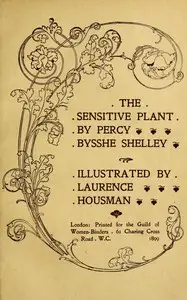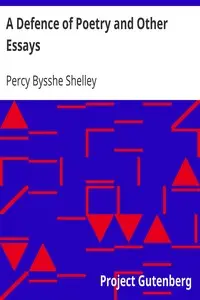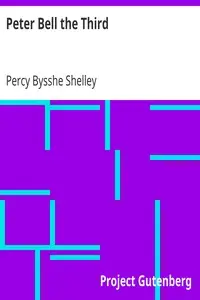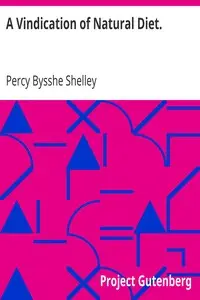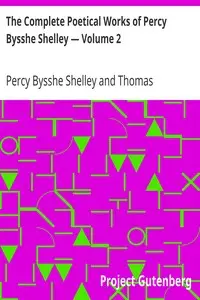"The Prose Works of Percy Bysshe Shelley, Vol. 1 [of 2]" by Percy Bysshe Shelley is a compilation of the author's prose pieces, assembled in the late 1800s, presenting a wide range of his early works, including the gothic novels "Zastrozzi" and "St. Irvyne," in addition to his political pamphlets and essays, revealing Shelley’s views on philosophy, politics, and artistic expression. The collection, colored with intense emotion and romantic flair, explores themes of love, revenge, and existential questions. The opening tale, "Zastrozzi," immediately immerses the reader in a world of dark romance and vengeance, where Verezzi is hunted by the villainous Zastrozzi, culminating in his capture and imprisonment; as the story unfolds, hope and despair clash as the psychological depths of captivity are exposed, setting the stage for a broader exploration of vengeance, insanity, and psychological struggle.
![The Prose Works of Percy Bysshe Shelley, Vol. 1 [of 2] by Percy Bysshe Shelley](https://cdn.a2-host.cloud/PTMGFhqBHs6N6Y_h_cL0IKkV82OVgv6FGAOjEJ0PeII/rs:fill:760:1100:0/g:ce/aHR0cHM6Ly9zcC1hc3NldHMuczMudXMtd2VzdC0wMDQuYmFja2JsYXplYjIuY29tL2Jvb2svNjc5MjUvVGhlX1Byb3NlX1dvcmtzX29mX1BlcmN5X0J5c3NoZV9TaGVsbGV5X1ZvbF8xX29mXzJfY292ZXIuanBn.webp)
The Prose Works of Percy Bysshe Shelley, Vol. 1 [of 2]
By Percy Bysshe Shelley
In a world of shadows and revenge, a man is hunted and imprisoned, setting off a chain of psychological struggles.
Summary
About the AuthorPercy Bysshe Shelley was an English writer who is considered one of the major English Romantic poets. A radical in his poetry as well as in his political and social views, Shelley did not achieve fame during his lifetime, but recognition of his achievements in poetry grew steadily following his death, and he became an important influence on subsequent generations of poets, including Robert Browning, Algernon Charles Swinburne, Thomas Hardy, and W. B. Yeats. American literary critic Harold Bloom describes him as "a superb craftsman, a lyric poet without rival, and surely one of the most advanced sceptical intellects ever to write a poem."
Percy Bysshe Shelley was an English writer who is considered one of the major English Romantic poets. A radical in his poetry as well as in his political and social views, Shelley did not achieve fame during his lifetime, but recognition of his achievements in poetry grew steadily following his death, and he became an important influence on subsequent generations of poets, including Robert Browning, Algernon Charles Swinburne, Thomas Hardy, and W. B. Yeats. American literary critic Harold Bloom describes him as "a superb craftsman, a lyric poet without rival, and surely one of the most advanced sceptical intellects ever to write a poem."

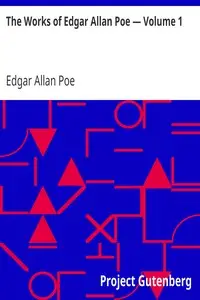
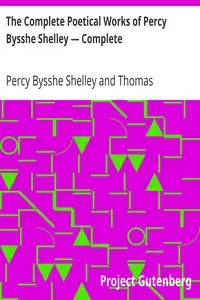
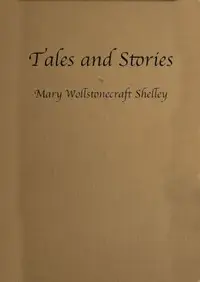
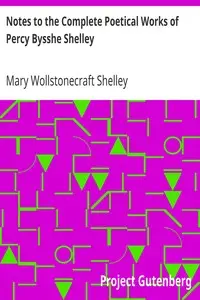
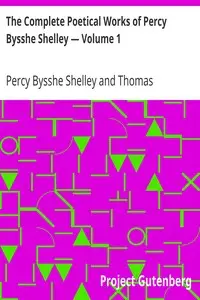
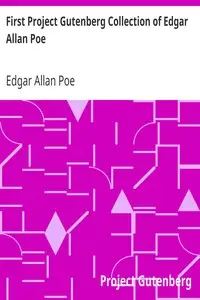
![The Prose Works of Percy Bysshe Shelley, Vol. 2 [of 2] by Percy Bysshe Shelley](https://cdn.a2-host.cloud/N5mkWLLMME8fsj53C1cwpEjUdDWU-6Y0rYa0VHN1zFM/rs:fill:215:325:0/g:ce/aHR0cHM6Ly9zcC1hc3NldHMuczMudXMtd2VzdC0wMDQuYmFja2JsYXplYjIuY29tL2Jvb2svNjc5MjYvVGhlX1Byb3NlX1dvcmtzX29mX1BlcmN5X0J5c3NoZV9TaGVsbGV5X1ZvbF8yX29mXzJfY292ZXIuanBn.webp)
